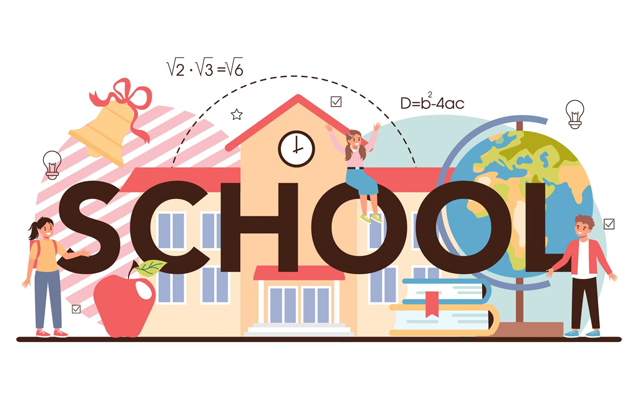Adapting to School
When children start school, it marks the beginning of an exciting time for them and their families. However, the process of adjusting to school can sometimes be anxious or frightening for children. School adaptation involves getting children used to the routines, rules and social dynamics of school, while at the same time supporting their emotional and intellectual development.
School adaptation is an important step for children to express themselves, make friends and start learning. If this process proceeds in a healthy and positive way, it serves as a foundation stone for children's future education and personal development.
Adaptation to the New School Semester
In order to comprehensively address this process, which you can support with online therapy, we have examined it under 2 main headings: seasonal transition and returning to school from vacation.
1. Transition from Summer to Winter:
- Physical Changes: Children grow and develop during the summer months. Vacation provides an opportunity for them to play outdoors and experience physical activities. During this period, children can become stronger and more capable.
- Social Experiences: Vacation is also an opportunity for children to make new friends and develop their social skills. Activities such as camping, summer camps or family visits can help children deepen their relationships.
- Emotional Growth: Vacation can boost children's self-confidence and allow them to discover their authenticity. As they develop their own interests and passions, they also grow emotionally.
2. Back to School from Vacation:
- Routine Changes: When vacation ends, there is a significant change of routine for children. They have to accept a new daily schedule, such as organizing their sleep, getting ready for school in the morning and focusing on lessons.
- Academic Challenges: Back to school can mark a time of increased academic demands. Children should be prepared to learn new subjects and start homework.
- Friendship Dynamics: School is a place where children develop social skills and maintain friendships. Sometimes, however, they may need to make an effort to make new friends or strengthen existing friendships.
- Emotional Balance: Returning to school from vacation can cause emotional fluctuations among children. Feelings such as anxiety, excitement, sadness and uncertainty are normal. Families play an important role in understanding and supporting this emotional process.
- The transition from summer to winter and back to school from vacation is part of children's growth journey. Supporting children physically, emotionally and academically during this time can help them make a healthy adjustment. In addition, a family environment filled with open communication, understanding and love can make these transitions easier.
The Responsibility of Families
Managing this process correctly and effectively starts at home. It is very valuable to support the primary school adaptation process at home, in the family environment, where you can add value with online therapy. So, what are the duties of us families in this process?
According to the recommendations of WTC therapists;
- Open Communication:
- Talk openly with your children about this transition.
- Listen to their feelings and concerns.
- Explain to them that going back to school is normal and that everyone goes through this change.
- Time Management and Establishing Routines:
- Establish a new daily routine for back to school.
- Organize sleeping, eating and class times.
- Teach your children how to manage their time effectively.
- Provide Positive Motivation:
- Understand your children's anxieties about going back to school.
- Convince them that school is a fun and educational place.
- Boost their self-confidence by focusing on and encouraging their achievements.
- Provide Academic Support:
- Prepare learning materials for the start of school.
- Teach your children how they can help to learn and communicate with their teachers.
- Regularly help with lessons and check their homework.
- Supporting Friendship Relationships:
- Give your children opportunities to develop friendship skills.
- Support their relationships with school friends and encourage them to participate in social activities outside of school.
- Providing Emotional Support:
- Be understanding of your children's emotional fluctuations.
- Support emotional reactions such as anxiety, sadness or fear.
- Give them the opportunity to share their problems and successes at school.
- Positive Goodbye and Welcome Rituals:
- Create a positive goodbye ritual before leaving for school in the morning.
- Upon returning from school, greet your children with a warm welcome.
- Developing Self-Care Skills:
- Teach your children self-help and responsibility skills. For example, allow them to gradually take on daily tasks such as dressing, packing bags and organizing homework.
Responsibilities of the School in the Adaptation Process
In this process, of course, the school, teachers, administrators and guidance counselors have a great responsibility. We have written for you about this process that you can manage in the healthiest way with the trilogy of online psychologist, school and family.
1. Providing a Safe Environment: The school should provide a safe environment for children. Physical and emotional safety helps students learn and develop comfortably.
2. Creating a Student Friendly Atmosphere: The school should welcome students and provide them with a warm atmosphere. A positive school culture helps children feel special and valued.
3. Preparing Educational Materials: The school should regularly prepare students' educational materials and resources. This supports students' learning.
4. Recognizing Students and Providing Support: Each student's individual needs are different. The school should recognize students and provide additional support if needed. This can contribute to students' success.
5. Keeping Communication Open: The school should maintain regular and open communication with families. In particular, a communication channel that allows families to follow their child's progress at school is important.
6. Providing Emotional Support: The school should be sensitive to the emotional needs of children. This support is especially important for students who are new to school.
7. Encouraging Student Participation: The school should encourage student participation in classroom activities and in the school's community activities. This can help students develop a sense of belonging to the school.
8. Providing up-to-date and effective education: The school should use up-to-date and effective teaching methods and meet students' learning needs.
The school plays an important role in the process of children's adaptation to school. In fulfilling these responsibilities, it is important to remember that each child is unique and has different needs. By working in collaboration with the family and the educator, the school can help children to adapt in a healthy way.
Hashtags
adaptation new school year student family school education parent child adolescent
Categories
Actual Pedagogical (Family-Child-Adolescent)







